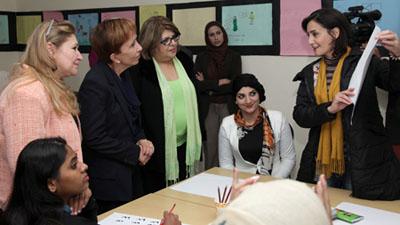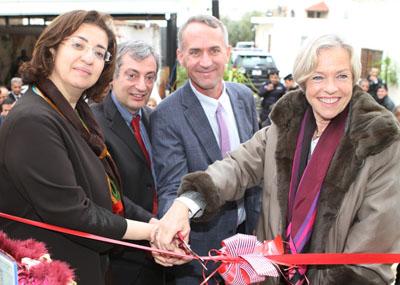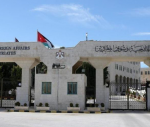You are here
Three-year communication strategy in place to address gender-based violence — Abu Hassan
By Rana Husseini - Jun 10,2014 - Last updated at Jun 10,2014
AMMAN — Social Development Minister Reem Abu Hassan on Tuesday said the ministry will adopt a three-year communication strategy to address gender-based violence in the country.
In an exclusive interview with The Jordan Times, Abu Hassan announced plans to open a new Family Reconciliation Centre (FRC) in Irbid, 80km north of Amman, in four months.
The minister said there are two facilities helping abused women and their children in Jordan: an FRC in an east Amman suburb run by the ministry and a shelter run by the Jordanian Women’s Union (JWU).
The JWU shelter opened in 1999 in the capital’s Jabal Hussein area with limited resources and services for abused women, and grew over the years as funding became available.
The ministry opened the FRC in 2007 to provide protection and counselling for abuse victims and offer temporary shelter for women and children under the age of five.
“We have met with the JWU and exchanged experiences in this regard and decided to open a shelter in the north that is supported by UNICEF,” Abu Hassan said.
She added that 40 per cent of the Syrian refugees in Jordan reside in the northern region and “we want to be able to help all women in that area with this centre.”
Future plans include establishing a similar centre in Aqaba in the south, and “we hope we can get the needed financial support to open it,” Abu Hassan noted.
Turning to the gender-based violence strategy, which is supported by the Spanish Agency for International Development Cooperation (AECID), the minister said it will officially be launched on June 25 “to further complement our work at the FRC”.
“We want to continue the cycle that we have been working on at the ministry and the FRC, which is mainly aimed at protecting domestic violence victims.”
Now, she added, “we want to work on the prevention part and focus on violence against women in particular.”
“We were dealing with violence within the family, but our efforts will now be geared towards women specifically in this strategy,” Abu Hassan explained.
Amer Hiasat, director of the social defence department at the ministry, noted that Jordan has been working to address domestic violence since 1997 with the establishment of the first family protection unit, run by the police in cooperation with the ministry.
“Now we have 12 family protection departments that include ministry offices in various governorates, and we opened the first women’s shelter in 2007, which is also when we started dealing professionally with violence against women,” Hiasat said.
He told The Jordan Times that the FRC has been dealing with around 900 cases annually since its establishment, and “this prompted the idea of working on a strategy that would raise awareness and provide prevention methods to protect women and children in Jordan.”
The communication strategy will include a short film depicting gender-based violence and its effects on women and their families, brochures and pamphlets tackling this matter and media campaigns, according to Hiasat.
The strategy will also serve as a policy document of cooperation between governmental and non-governmental organisations dealing with this topic and “to push this issue to become a priority always for decision makers”, he added.
In addition, it will work on amending “the wrongful concepts or religious teachings that are being used as an excuse to justify violence against women”.
“We will direct our messages to condemning violence socially and religiously, and correcting the social and religious misconceptions that are used as an excuse to practise violence against women,” Hiasat said.
Moreover, the strategy will unify the terminology used in describing violence by developing a glossary to be used by the media, he noted.
The strategy will also document cases of gender-based violence as well as success stories, according to the ministry official.
Related Articles
The Ministry of Social Development on Monday officially launched its three-year communication strategy to address gender-based violence in the country.
AMMAN — While anguish, abuse and exploitation are what drive women to seek help at the Jordanian Women’s Union (JWU), surviving and taking c
AMMAN — Dar Al Wifaq Al Osari branches have become important in light of the increasing violence against women and children, and the need to

















